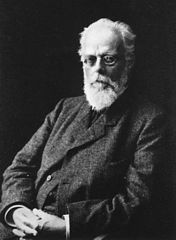
How would the creationism-evolution controversy have been different if World War I had never happened? Today the question is answered by Ulrich Kutschera, Professor of Plant Physiology and Evolutionary Biology at the University of Kassel. Long involved in efforts to defend the teaching of evolution in Germany against creationist assaults, he is the editor of Kreationismus in Deutschland: Fakten und Analysen (2007).
World War I lasted from July 28, 1914, to November 11, 1918. The most prominent evolutionary biologist of this time, the German zoologist/cytologist August Weismann (1834–1914), founder of the neo-Darwinian theory of biological evolution, formulator of the principle that hereditary information moves only from germline cells to somatic cells, and pioneer of genetics, died on November 5, 1914, i.e., three months before the war commenced.
 Weismann was an anti-creationist, and described creation as a biblical myth.
Weismann was an anti-creationist, and described creation as a biblical myth.
In 1902, Weismann published a very influential popular book, Vorträge über Deszendenztheorie, essentially summarizing his lectures at the University of Freiburg, in which he clearly documented that evolution is a fact and not only a theory. According to Weismann, all available evidence shows that organisms descended with modifications from a common ancestry, as Darwin had proposed. However, Weismann provided a mechanism for variability, an explanation of sexual reproduction, and a concept of inheritance that superseded Darwin’s idea of pangenesis.
His neo-Darwinian explanation for evolutionary change had a tremendous influence, but World War I resulted in the destruction of the German Empire, so his work was soon forgotten. If World War I had never happened, Weismannism would have become much more well-known, and the popular “only a theory” slogan would have disappeared forever—or, at least, would have been harder to maintain in the face of the scientific consensus to the contrary.
